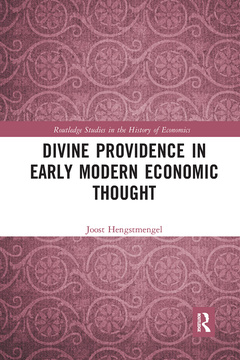Description
Divine Providence in Early Modern Economic Thought
Routledge Studies in the History of Economics Series
Author: Hengstmengel Joost
Language: English
Subjects for Divine Providence in Early Modern Economic Thought:
Keywords
Animal Kingdom; William King; Vice Versa; Soame Jenyns; Good Life; Grotius; Hugo Grotius; Rich Country Poor Country; Della Moneta; Jean Domat; Capitoline Temple; Paul The Apostle; Early Modern Economic; Early Modern; Le Parfait Negociant; Anne Robert Jacques Turgot; Natural Law Philosophers; Divine Providence; Water Diamonds Paradox; Civil Society; Early Modern Political Economy; Caspar Barlaeus; Remarkable Providences; Enlightened Self-love; Divine Abundance
Publication date: 12-2020
· 15.6x23.4 cm · Paperback
Publication date: 05-2019
· 15.6x23.4 cm · Hardback
Description
/li>Contents
/li>Readership
/li>Biography
/li>
In this important volume, Joost Hengstmengel examines the doctrine of divine providence and how it served as explanation and justification in economic debates in the sixteenth, seventeenth and eighteenth centuries throughout Western Europe. The author discusses five different areas in which God was associated with the economy: international trade, division of labour, value and price, self-interest, and poverty and inequality. Ultimately, it is shown that theological ideas continued to influence economic thought beyond the Medieval period, and that the science of economics as we know it today has theological origins.
Interdisciplinary in nature, this book will be of interest to advanced students and researchers in the history of economic thought, the history of theology, philosophy and intellectual history.
1. Introduction 2. The history of divine providence 3. International trade: God’s universal economy 4. Division of labour: the divine ordering of society 5. Value and price: a providential abundance of necessities 6. Self-interest: the invisible hand of God 7. Poverty and inequality: rich and poor God-willed 8. Conclusions
Joost Hengstmengel is a postdoctoral researcher at the Tilburg School of Catholic Theology, Tilburg University, the Netherlands.




